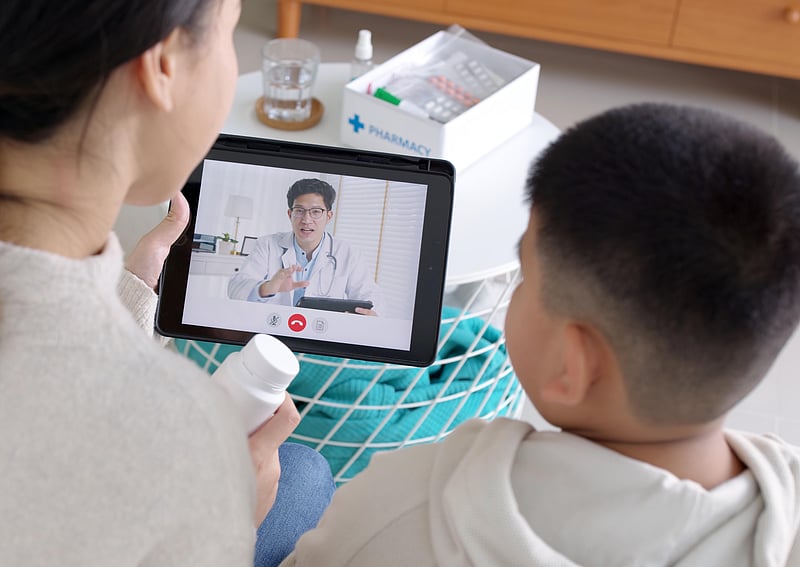Call for more details at (504) 267-4100.
Get Healthy!

- Dennis Thompson
- Posted January 3, 2022
Telemedicine as Good as In-Person for Many Health Conditions: Review
Chatting with your doctor via video about your health issues works just as well as an in-person office visit, at least when it comes to managing chronic illnesses, a new review suggests.
Replacing office visits with video checkups delivered results that were just as effective for patients being treated for conditions like diabetes, respiratory illnesses, chronic pain, heart problems and neurological disorders, researchers reported recently in the Annals of Internal Medicine.
"In general, the evidence shows that using video teleconferencing in health care results in outcomes that are just as good as and in some cases better than in-person care," said lead researcher Jordan Albritton, a public health analyst with RTI International, a nonprofit research institute in Research Triangle Park, N.C.
Despite these findings, experts maintain that in-person physical exams remain essential to quality health care, particularly for new patients who have just fallen ill.
"Telemedicine is a very limited form of really assessing a patient," said Dr. Len Horovitz, an internist and pulmonologist at Lenox Hill Hospital in New York City.
"Sure, if it's a follow-up visit, let's say you're following a diabetic and they can take their blood sugars and they're good reporters, you can manage things and make adjustments," he continued. "But I can't imagine taking care of a patient virtually as a first visit and keeping that patient as an internist without a complete examination in person."
The COVID-19 pandemic has led to a dramatic increase in the use of video teleconferencing in health care, researchers explained in background notes. A 2020 survey found that 22% of patients and 4 of 5 doctors reported having participated in a video health exam -- three times the rate from the previous year.
For this study, Albritton and his colleagues analyzed 20 clinical trials conducted between 2013 and 2021 that tested telemedicine's ability to either replace or enhance the usual care a patient would receive through office visits.
The trials found that video telemedicine generally provided care as good as in-person care, and sometimes was even better.
But the researchers noted that the clinical trials included in the study didn't evaluate telemedicine's effectiveness in diagnosing new illnesses or providing preventive care.
"The studies generally are looking at things that can be followed and evaluated at a distance," Albritton said.
"The takeaway is not that you never need to see your doctor in person," he added. "The takeaway is that for the conditions that being studied here, it does seem like using video teleconferencing is as good as or better in some instances than doing it in person."
Horovitz said that as a doctor he's been frustrated by telemedicine "because you can't really examine a patient."
He cited COVID as a great example.
"Someone thinks they're exposed. They're hysterical. You can't really tell them how much is hysteria and how much is symptoms," Horovitz said. "They don't have a pulse oximeter. They don't have a thermometer. They don't have enough equipment to give you any data. You're trying to look at them and make a judgment, which usually means you have to refer them to an urgent care center or an emergency room."
On the other hand, people with a chronic condition like diabetes or high blood pressure might do well with regular telemedicine check-ups because it's more convenient for them than an office visit, Horovitz said.
The patients also are more likely to have the equipment that provides the data doctors need to keep track of such conditions, like blood pressure cuffs or glucose tests, he added.
More research is needed to figure out exactly where telemedicine can best be deployed to help keep people healthy, Albritton said.
"I do think the outlook for video teleconferencing, for telehealth in general, where the research needs to go is to find those areas where it really can be transformative in health care," he said. "I think these studies show some potentials, some opportunities where it really can drive improvements, but we need to determine the factors that are going to come into play to determine whether or not that's actually going to be the case."
More information
Johns Hopkins has more about the benefits of telemedicine.
SOURCES: Jordan Albritton, PhD, MPH, public health analyst, RTI International, Research Triangle Park, N.C.; Len Horovitz, MD, internist/pulmonologist, Hill Hospital, New York City; Annals of Internal Medicine, Dec. 7, 2021





